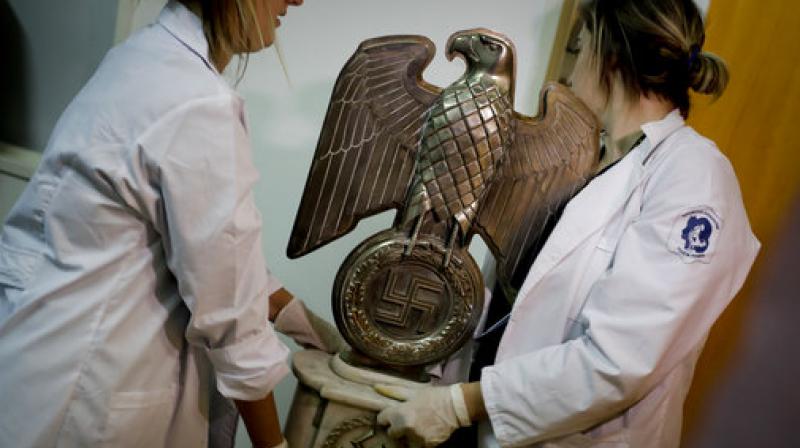Hidden Nazi artifacts resurface in Argentina

In a hidden room in a house near Argentina's capital, police believe they have found the biggest collection of Nazi artifacts in the country's history, including a bust relief of Adolf Hitler, magnifying glasses inside elegant boxes with swastikas and even a macabre medical device used to measure head size.
Some 75 objects were found in a collector's home in Beccar, a suburb north of Buenos Aires, and authorities say they suspect they are originals that belonged to high-ranking Nazis in Germany during World War II.
"Our first investigations indicate that these are original pieces," Argentine Security Minister Patricia Bullrich told The Associated Press on Monday, saying that some pieces were accompanied by old photographs. "This is a way to commercialize them, showing that they were used by the horror, by the Fuhrer. There are photos of him with the objects."
Among the disturbing items were toys that Bullrich said would have been used to indoctrinate children, a large statue of the Nazi Eagle above a swastika, a Nazi hourglass and a box of harmonicas.
Police say one of the most-compelling pieces of evidence of the historical importance of the find is a photo negative of Hitler holding a magnifying glass similar to those found in the boxes.
"We have turned to historians and they've told us it is the original magnifying glass" that Hitler was using, said Nestor Roncaglia, head of Argentina's federal police. "We are reaching out to international experts to deepen" the investigation.
The photograph was not released to the public, but was shown to The Associated Press on the condition that it not be published.
The investigation that culminated in the discovery of the collection began when authorities found artworks of illicit origin in a gallery in north Buenos Aires.
Agents with the international police force Interpol began following the collector and with a judicial order raided the house on June 8. A large bookshelf caught their attention and behind it agents found a hidden passageway to a room filled with Nazi imagery.
Authorities did not identify the collector who remains free but under investigation by a federal judge.
"There are no precedents for a find like this. Pieces are stolen or are imitations. But this is original and we have to get to the bottom of it," said Roncaglia.
Police are trying to determine how the artifacts entered Argentina.
The main hypothesis among investigators and member of Argentina's Jewish community is that they were brought to Argentina by a high-ranking Nazi or Nazis after World War II, when the South American country became a refuge for fleeing war criminals, including some of the best known.
As leading members of Hitler's Third Reich were put on trial for war crimes, Josef Mengele fled to Argentina and lived in Buenos Aires for a decade. He moved to Paraguay after Israeli Mossad agents captured Holocaust mastermind Adolf Eichmann, who was also living in Buenos Aires. Mengele later died in Brazil in 1979 while swimming in a beach in the town of Bertioga.
While police in Argentina did not name any high-ranking Nazis to whom the objects might have originally belonged, Bullrich noted there were medical devices.
"There are objects to measure heads that was the logic of the Aryan race," she said.
Ariel Cohen Sabban, president of the DAIA, a political umbrella for Argentina's Jewish institutes, called the find "unheard of" in Argentina.
"Finding 75 original pieces is historic and could offer irrefutable proof of the presence of top leaders who escaped from Nazi Germany," Cohen said.

